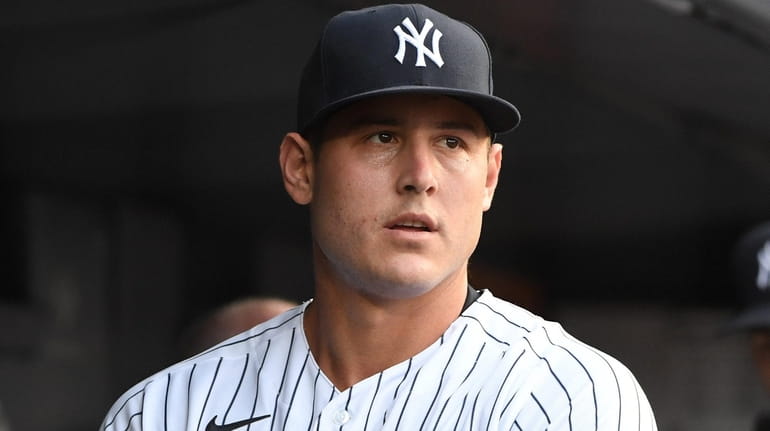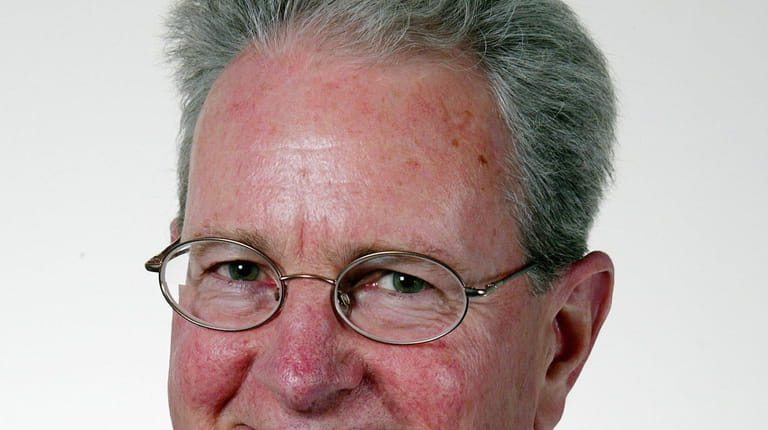Pro athletes should be vaccinated

Yankees first baseman Anthony Rizzo chose not to get the COVID-19 vaccination. Credit: Kathleen Malone-Van Dyke
Start with the obvious. Social distancing will not facilitate sacking the quarterback. Or just about any other jock endeavor. Competitive sports cannot happen from home via Zoom on a laptop. And masking, though helpful in some situations, clearly isn’t the answer for athletic duties that involve physical proximity, relentless travel and adhering to schedules not conducive to quarantine interruptions.
You can see where this is going. Incapable of operating remotely, sports leagues, more than most businesses, need their employees to be vaccinated to avoid COVID-19 and its attendant headaches.
Just as clear, in a land where the sports establishment is deeply embedded in our culture and its wars, is the fact that some high-profile athletes are protesting the inoculation push. Their arguments are not particularly sound.
Take the freedom-and-personal-choice claim. What are the chances that the National Football League will allow unvaccinated players to gum up its massive financial commitments to provide televised entertainment? The so-called No Fun League metes out punishment against such picayune violations as untucked jerseys and touchdown celebrations.
In an occupation that promises Darwinian competition for jobs and historically short careers, the NFL has further tightened the noose for survival: Unvaccinated players this season will face the loss of paychecks if they cause COVID outbreaks resulting in forfeitures.
The National Hockey League reportedly is considering withholding per-game salaries for any player sidelined by the virus. Major League Baseball so far has opted for extending more personal privileges — more freedom! — to vaccinated players while stopping short of a vaccine mandate, aware that it must negotiate the matter with the players union, whose collective bargaining agreement expires in December.
Since athletes’ livelihoods are based on their physical well-being, there certainly are those who (irrationally) reject the vaccine believing that they possess greater knowledge of the human body than the medical community. Or that they don’t yet have enough information regarding vaccine safety, though league officials, team doctors, union reps and government officials have been broadcasting relevant data for months. Now that the U.S. Food and Drug Administration has given its stamp of approval to the Pfizer-BioNTech vaccine, that defense has been defeated.

John Jeansonne on Aug. 22, 2003. Credit: Newsday Staff Photographer/John Keating
Here’s a quid pro quo overwhelmingly reasonable for both sides: If all players do their teams (and the general public) the kindness of submitting to vaccines, the players in exchange will be freed from enduring last year’s annoying protocols of competing in fan-less "bubbles" away from home and family, traveling in split parties, quarantining, and undergoing constant testing.
And here's a bonus: As semi-celebrities, accomplished athletes often are granted the status of role modeling. They don’t necessarily have the expertise, nor the intellectual horsepower, to discourse on matters of science. But that doesn’t stop them from receiving disproportionate attention when they do.
Given that reality, professional athletes’ public acceptance of COVID vaccines would reinforce mandates similar to New York City’s requirement that all public high school athletes and coaches be inoculated to participate in "high-risk" sports — defined as football, basketball, wrestling, volleyball, lacrosse and rugby. (Nassau and Suffolk county officials have not taken this step.)
As a sports journalist for half a century, I am a fan of athletic performance, drawn to the drama of games, the physical feats, the quirky characters. But when it comes to a pandemic and anti-vaccine blatherings from the likes of baseball’s Anthony Rizzo and football’s Cole Beasley, among other impressively skilled athletes, I’m convinced that our real freedom is having access to the educated judgment of all-star epidemiologists.
These players need to take one for the team.
This guest essay reflects the views for former Newsday sports reporter John Jeansonne.
